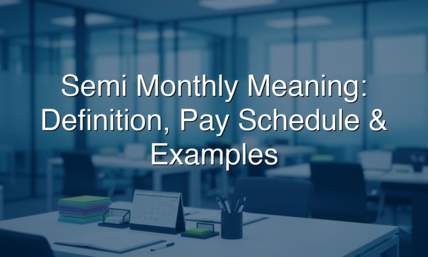Is Depreciation an Operating Expense? - What to Know
When you are examining your business, you want to not only see that everything is running smoothly, but that you are turning a profit and your assets are increasing in value. So, it may be disheartening for many business owners to see that the exact opposite of this is happening.
When this does occur, there will be a flurry of activity at the top to find the cause or a solution to the problem. Most often they will look at operating expenses and how they are affecting the cash flow of the business. During these meetings about operating expenses, you may hear several times the word: ‘depreciation’.
Normally, it is not really explained and those outside the loop are left to flounder. Well, fear not for we are here to answer the business partner's most urgent questions, the main one today being what is depreciation? And how it may be an operating expense.
Also read: Can I Pay Off My Mortgage Early?
What is Depreciation?
Simply put, it is the gradual reduction of property, tools, or equipment in value to the owner or our society. It is the reduction in value of assets over time, as a result of the use of these assets. This can be due to wear and tear, or the simple fact that the asset is no longer new, and is, instead, aged.
Great examples of this are cars and computers. While a brand-new car, like a Tesla, is worth a lot of money now, it will depreciate in value over time. This is not just because the technology in the automotive industry may advance, but because of the use of the car.
Since people tend to use cars every day, the car will become of less and less value to not only the owner, but potential buyers of the car, as it will become less reliable over time.
The same is true of computers, though computers are slightly different as well. While wear and tear will eventually lead to the degradation of the computer, it is far more likely that it will just be made obsolete within a short space of time, maybe one or two years.
This is because the advancement of computer technology moves at a speed that is very quick and often new technology of today will be obsolete within a very short period. Sometimes years, sometimes months. Once that new technology is on the market, your computer's value will depreciate at an extraordinary rate.
The length of time over which this takes place is highly flexible, and also highly dependent on applicable laws, regulations, the industry of the product, and the view of the public at large. These are all factors that are difficult to plan for or see as they are highly dependent on different people’s views – the government for laws and regulations, the CEOs and marketing for the industry, and the public for public perception.
Since people are fickle creatures, this can change on a whim.
Also read: What is a Bridge Loan?

What is an Operating Expense?
Operating expenses are the costs relating to the running of your business on a day-to-day basis. They include wages, overheads and all other costs that are necessary to keep the business running, and are normal expenses.
Unusual, abnormal, or unique expenses are not part of your operating expense, because they occur outside of normal business expenses. A good example would be a food supply company. An operating expense would be paying your HGV drivers to deliver the food to supermarkets. It happens every day and is necessary to running your business.
An unusual expense that is not part of your operating expense would be supplying food to a market way outside your normal area. Since it is not a usual occurrence, the expense of the delivery is not factored into your everyday running costs, thus not making it an operating expense.
Also read: Checklist For Moving Into Your New House
Methods of Depreciation
There are three common methods that companies can use to record the declining value of an asset over time, however it should be noted that there are other methods for measuring depreciation. They are: straight-line, double-declining balance, and sum-of-the-years-digits.
The straight-line method is the simplest to understand. It makes the assumption that the depreciation expense of the asset stays at a constant level for every year the asset has been or was used. So, every year it moves downward in depreciation at the same rate.
Straight line = (Cost-Salvage value)/Useful life left in asset.
Double-declining balance and sum-of-the-years-digits calculations make the assumption that the asset will be more productive at the start of its useful life for the company. As such, they make a calculation that makes a sharp depreciation at the beginning of the asset's life, as it is being used more, and then it balances out and loses less value as the years go on.
Double-declining balance = ((Cost-Salvage value)/Useful life left in asset) x 2.
Sum-of-the-years’-digits = (Estimated remaining life/Sum of current years in use) x (Cost-salvage value).
Also read: How to Apply For a FHA Loan?
What Things Depreciate in Value?
A lot of things will depreciate in value over time, and there are a lot of dependent factors to determine why. However, the most common and prominent items that depreciate in value are:
- Inventory - The longer that inventory remains unsold, the less value it has, especially if it has a shelf life.
- Machinery—As long as it is not broken, then it is worth the cost that you paid for it. However, it will lose value over time through use and if it is made obsolete.
- Construction—Like machinery, it is generally worth the amount that you pay for it, but will lose value over time. This is due to changing regulations and laws. For example, mobile homes that were built before the 1970s are considered not only of no value, but dangerous to those who own them.
- Automobiles—Cars, trucks, tractors, and any other automobile will depreciate in time through constant use. They can also depreciate if manufacturers begin using new technology within them that requires constant maintenance, as is the case with modern tractors.
- Rental assets—This is where a business rents out assets such as a building or a van. Unlike construction, this is highly dependent on public opinion of your rental asset and in what area it operates. For example, if you have a rental asset in San Francisco, a highly sought after area for people moving, then this is a high value asset, but should you have one in St Louis, which is experiencing a population decline, then this is a depreciating asset.
Is Depreciation an Operating Expense?
Absolutely, it is. If an asset you use all the time or make is depreciating in value, it will affect your everyday expenses and begin to affect your business as a whole. This can be from a decline in sales, machinery braking, or even just that your building needs repairs, and all of them affect how well your business runs, which affects your operating expense.
Unfortunately, there is not much you can do to deal with depreciation before it happens, you just need to know it is coming and save a bit for when you need to deal with it.
Also read: Pay Yourself When You Have An LLC

Conclusion
Depreciation of the value of an asset is almost definitely an operating expense for your business, and while you can not stop it coming, you can certainly plan for it. By planning, you can avoid the worst of the effects of depreciation on your business and keep everything running smoothly and comfortably.
Pay stubs are important documents when it comes to the topic of finance and it is vital that a reliable way of generating pay stubs is at your disposal. That is where our pay stub generator comes into play. Simple and high-quality pay stubs are available without any hassle.
















